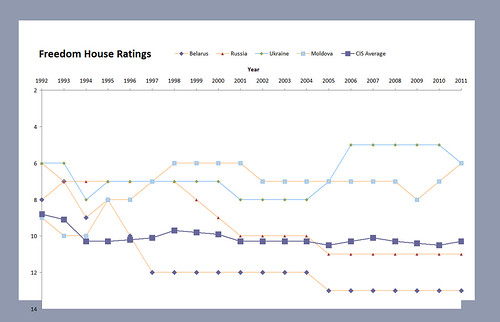24th January 2011
Is Ukraine free?
Which is the country which is most free in the CIS? Can we say confidently that it is Ukraine? Or how about a new pretender to that crown – Moldova?
There are many ways to measure freedom, some more objective than others. As I noted in a recent blog on human rights, one can often get a feel for the degree of freedom in a country as soon as one arrives at the airport. But such impressions are inevitably subjective.
That makes the Freedom in the World 2011 Survey produced by US-based non-governmental organisation Freedom House, an important document. The survey attempts to form an objective assessment, giving countries scores of between 1 (good) and 7 (bad) for political rights and civil liberties respectively, producing a potential top score of 2 and a potential bottom score of 14. It then groups countries into Free (scoring 2-5 points); Partly Free (6-10); and Not Free (11-14). In 2005 Ukraine became the first, and so far the only, CIS country which Freedom House classed as Free, with a score of 5 for the period 2005-10. For 2011, Ukraine’s score slips by one point to 6, placing it in the “Partly Free” category, with the same score as Moldova. Moldova, meanwhile, is on an upward trajectory having seen its score rise from 8 in 2009 to 7 in 2010 and 6 in 2011. Freedom House explains the fall in Ukraine’s score by “deteriorating media freedom, secret service pressure on universities to keep students from participating in protests, government hostility toward opposition gatherings and foreign non-governmental organisations, and an increase in presidential influence over the judiciary”.
One may debate the methodology used by Freedom House. But the report is important for several reasons:
– it is a reminder that improvements in political rights and civil liberties are not always linear. A super chart (below) prepared by my embassy colleagues shows how, for Ukraine, Belarus, Russia, Moldova and the CIS as a whole, the Freedom House ratings have moved around, often significantly, since 1992. This is the political equivalent of “you’re only as good as the last hamburger you served”. In other words, countries which have achieved gains in freedoms must keep working ceaselessly to maintain them. This is true in Ukraine, the United Kingdom or anywhere else;
– Ukraine has only slipped one point in the rankings from 2010 to 2011, but this has taken it down a category from “Free” to “Partly Free”. The fact that Moldova now has the same score means that both can, in theory, argue that the Freedom House ratings show them to be the most democratic countries in the CIS. It will be fascinating to see who scores most highly next year;
– whatever your opinion of the methodology, Ukraine’s descent into the “Partly Free” category will reinforce concerns about the development of democracy and freedom of speech. The fact that the country has slipped only one point shows that there is everything still to play for and – I hope – that Ukraine can restore its position in the “Free” category next year.
The challenge for the Ukrainian authorities now is to do everything they can restore Ukraine’s “Free” rating by demonstrating respect for political rights and civil liberties in the year ahead. If that means we are now going to see a fierce competition between Ukraine and Moldova for the title of “Most Free Country in the CIS”, so much the better.

Ukraine will never be a Free Independent Democratic Stet as long as it is beholden to a presidential rule.
Ukraine has struggled since independence to adopt a Parliamentary system of governments as enjoyed in Britain. Former Ukrainian President Viktor Yushchenko opposed Ukraine becoming a democracy
Latvia and Estonia are both former Soviet States and they correctly adopted a parliamentary model. Both are now successful EU member states. Ukraine on the other hand retained the Soviet Style Autocratic Presidential system.
One of the most significant achievements of the Orange revolution was the Constitutional reforms of 2004 which saw Ukraine take a step forward towards becoming a Parliamentary democracy. The main problem is it still retained Presidential authority which lead to power struggle between the head of state and the peoples democratically elected Parliament.
Viktor Yushchenko continually sought to undermine political stability and Ukraine’s democratic development. His dismissed Ukraine’s previous Parliament in 2007 in order to prevent the Parliament from securing support for further constitutional reform and removal of Presidential power. Reform that would have seen Ukraine become more like Britain. He even went as far as deliberately interfering with the operations and independence of Ukraine’s Constitutional court in order to prevent the Court from ruling against his decree. Yushchenko’s actions were illegal and unconstitutional and caused seven months of political and civil unrest.
Yanukovych since being elected President has acted to consolidate presidential authority, going so far as seeking a Constitutional Court ruling nullifying the constitutional reforms introduced in 2004. (Interested readers should read the unprecedented review of the Courts deliberations undertaken by the European Venice Commission)
Britain’s system of Parliamentary democracy is the corner stone if its success along with Canada, Australia, New Zealand, India and the majority of EU states.